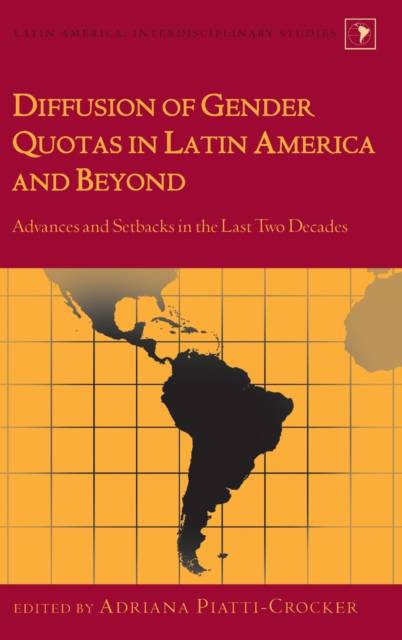
Door een staking bij bpost kan je online bestelling op dit moment iets langer onderweg zijn dan voorzien. Dringend iets nodig? Onze winkels ontvangen jou met open armen!
- Afhalen na 1 uur in een winkel met voorraad
- Gratis thuislevering in België vanaf € 30
- Ruim aanbod met 7 miljoen producten
Door een staking bij bpost kan je online bestelling op dit moment iets langer onderweg zijn dan voorzien. Dringend iets nodig? Onze winkels ontvangen jou met open armen!
- Afhalen na 1 uur in een winkel met voorraad
- Gratis thuislevering in België vanaf € 30
- Ruim aanbod met 7 miljoen producten
Zoeken
Diffusion of Gender Quotas in Latin America and Beyond
Advances and Setbacks in the Last Two Decades
€ 175,45
+ 350 punten
Omschrijving
This book studies the adoption and diffusion of gender quotas in Latin America and beyond. Gender quotas are institutional mechanisms intended to increase the proportion of women rapidly and effectively in key decision-making political posts. Since the 1980s, gender quotas have been implemented in various governmental bodies and, more commonly, in legislatures. Starting in Northern Europe, these policies have expanded to other European countries and later to thirteen Latin American countries. Yet, whereas gender quotas in most European countries - with the exception of Belgium and France - have been adopted voluntarily by some political parties, in Latin America national legislation mandates all parties to include in their lists a quota for women candidates to legislatures.
Although recent scholarship on gender quotas has been devoted to the adoption of gender quotas in a variety of countries, little has been done on Central and South America, despite the fact that the legislative quota wave originated there. Diffusion of Gender Quotas in Latin America and Beyond remedies that situation and provides a rich comparative analysis of this policy proliferation in Latin America as well as outside this region by also examining the adoption of legislative quotas in Armenia, Bosnia-Herzegovina, and Serbia.
Although recent scholarship on gender quotas has been devoted to the adoption of gender quotas in a variety of countries, little has been done on Central and South America, despite the fact that the legislative quota wave originated there. Diffusion of Gender Quotas in Latin America and Beyond remedies that situation and provides a rich comparative analysis of this policy proliferation in Latin America as well as outside this region by also examining the adoption of legislative quotas in Armenia, Bosnia-Herzegovina, and Serbia.
Specificaties
Betrokkenen
- Uitgeverij:
Inhoud
- Aantal bladzijden:
- 263
- Taal:
- Engels
- Reeks:
- Reeksnummer:
- nr. 19
Eigenschappen
- Productcode (EAN):
- 9781433110870
- Verschijningsdatum:
- 31/10/2011
- Uitvoering:
- Hardcover
- Formaat:
- Genaaid
- Afmetingen:
- 156 mm x 234 mm
- Gewicht:
- 571 g

Alleen bij Standaard Boekhandel
+ 350 punten op je klantenkaart van Standaard Boekhandel
Beoordelingen
We publiceren alleen reviews die voldoen aan de voorwaarden voor reviews. Bekijk onze voorwaarden voor reviews.










